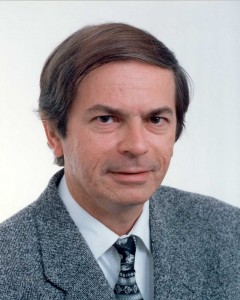 Department of Chemistry
Department of Chemistry
McMaster University
Gary J. Schrobilgen, a native of Eastern Iowa, received his BSc degree in chemistry from Loras College (Dubuque, Iowa), a MSc degree in inorganic chemistry from Brock University, and carried out his PhD research in inorganic chemistry at McMaster University under the supervision of Professor Ronald J. Gillespie. Professor Schrobilgen was an NSERC Postdoctoral Fellow at Leicester University, U.K. and joined the McMaster Chemistry Department as an NSERC University Research Fellow and member of faculty in 1980, and was promoted to full Professor of Inorganic Chemistry in 1988.
He has made important contributions in two major areas of synthetic and structural inorganic chemistry; fluorine chemistry and the polyatomic anions of the main-group elements. Both programs are heavily reliant upon the use of modern methods of structural elucidation, including multi-NMR spectroscopy, X-ray crystallography and vibrational spectroscopy, as well as quantum-chemical calculations, to characterize novel bonding situations among main-group and high-oxidation state transition element species. He is best known for his work in the experimentally challenging field of fluorine chemistry, encompassing the syntheses and structural characterization of a large percentage of the known compounds of krypton and xenon as well as fluoro- and oxofluoro-derivatives of the main-group and transition elements in their highest oxidation states and at the limits of coordination. He is also known for his work in two areas of radiochemistry, which involve the syntheses of 99Tc fluorine compounds that are relevant to the uranium fuel cycle, and 18F-labelled radiopharmaceuticals of use in PE (positron emission) imaging of the human brain. His fundamental work has been of importance in our understanding of structure and chemical bonding in so-called “hypervalent” molecules and main-group ring, cage, and cluster species. Most recently, he and his research group at McMaster have synthesized and characterized the Xe(IV) oxide, XeO2, for the first time, as well as the first examples of Xe(II) oxide fluorides, O(XeF)2 and FXeOXeFXeF+. Many of his compounds are now textbook examples.
Another of Professor Schrobilgen’s trademarks has been his hands-on approach to graduate and undergraduate training in experimental inorganic chemistry. He is recipient of the President’s Award for Excellence in Graduate Supervision at McMaster University (1997); the American Chemical Society Award for Creative work in Fluorine Chemistry (1998); several Canadian Society for Chemistry Awards: the Alcan Lecture Award (2002), the Award for Pure or Applied Chemistry (2002), the E. W. R Steacie Award in Chemistry (2003), Thirty from the Past Thirty Award (Recognizing Excellence Among Brock University Alumni); and has held a Canada Council Killam Research Fellowship (1998-99). He was inducted as a Fellow of the Royal Society of Canada in 1999. Professor Schrobilgen has served on the Executive Committee of the Division of Fluorine Chemistry of the American Chemical Society (2002-2011), and has held the positions of Vice Chair/Secretary (2002-2004), Chair (2005) and Past Chair of the Fluorine Division (2006) during this period. Most recently, he has been received a senior Humboldt Forschungspreis (Research Award) from the Alexander von Humboldt Foundation, the McMaster University Distinguished Alumni Award in the Sciences (2011), and the Lifetime Achievement Award in Fluorine Chemistry sponsored by SciFluor (2012).

